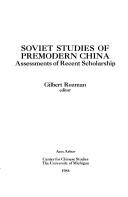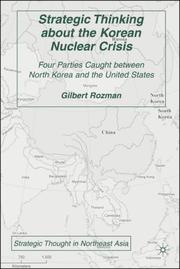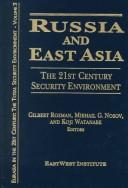| Listing 1 - 6 of 6 |
Sort by
|
Book
ISBN: 0691094292 1322005931 0691609829 1400858593 9781400858590 9780691094298 9780691609829 Year: 1987 Publisher: Princeton, N.J. Princeton University Press
Abstract | Keywords | Export | Availability | Bookmark
 Loading...
Loading...Choose an application
- Reference Manager
- EndNote
- RefWorks (Direct export to RefWorks)
This study, based largely on Chinese journals rarely available to Western scholars, explores the abrupt turnabout of Chinese views of the Soviet Union from condemnations of revisionism" to appreciation for problems common to both countries.Originally published in 1987.The Princeton Legacy Library uses the latest print-on-demand technology to again make available previously out-of-print books from the distinguished backlist of Princeton University Press. These editions preserve the original texts of these important books while presenting them in durable paperback and hardcover editions. The goal of the Princeton Legacy Library is to vastly increase access to the rich scholarly heritage found in the thousands of books published by Princeton University Press since its founding in 1905.
Communism --- Public opinion --- Communisme --- Opinion publique --- Soviet Union --- China --- URSS --- Chine --- Foreign opinion, Chinese --- Foreign relations --- Opinion publique chinoise --- Relations extérieures --- S06/0423 --- S06/0440 --- S09/0506 --- -Public opinion --- -#SML: Joseph Spae --- Opinion, Public --- Perception, Public --- Popular opinion --- Public perception --- Public perceptions --- Judgment --- Social psychology --- Attitude (Psychology) --- Focus groups --- Reputation --- Bolshevism --- Communist movements --- Leninism --- Maoism --- Marxism --- Trotskyism --- Collectivism --- Totalitarianism --- Post-communism --- Socialism --- Village communities --- China: Politics and government--CCP: 1976 - 1989 --- China: Politics and government--Relations with other comm. parties: Russian and Eastern European (Ideological conflicts; also theoretical polemics) --- China: Foreign relations and world politics--China and Russia --- -Soviet Union --- -Foreign relations --- -Foreign public opinion, Chinese --- -S06/0423 --- -Communism --- Foreign public opinion, Chinese. --- Relations extérieures --- Советский Союз --- Ber. ha-M. --- Zwia̦zek Socjalistycznych Republik Radzieckich --- Szovjetunió --- TSRS --- Tarybų Socialistinių Respublikų Sąjunga --- SRSR --- Soi︠u︡z Radi︠a︡nsʹkykh Sot︠s︡ialistychnykh Respublik --- SSSR --- Soi︠u︡z Sovetskikh Sot︠s︡ialisticheskikh Respublik --- UdSSR --- Shūravī --- Ittiḥād-i Jamāhīr-i Ishtirākīyah-i Shūrāʼīyah --- Russia (1923- U.S.S.R.) --- Sovetskiy Soyuz --- Soyuz SSR --- Sovetskiĭ Soi︠u︡z --- Soi︠u︡z SSR --- Uni Sovjet --- Union of Soviet Socialist Republics --- USSR --- SSṚM --- Sovetakan Sotsʻialistakan Ṛespublikaneri Miutʻyun --- SSHM --- Sovetakan Sotsʻialistakan Hanrapetutʻyunneri Miutʻyun --- Unión de Repúblicas Socialistas Soviéticas --- Berit ha-Moʻatsot --- Rusyah --- Ittiḥād al-Sūfiyītī --- Rusiyah --- Rusland --- Soṿet-Rusland --- Uni Soviet --- Union soviétique --- Zȯvlȯlt Kholboot Uls --- Związek Radziecki --- ESSD --- Sahaphāp Sōwīat --- KhSHM --- SSR Kavširi --- Russland --- SNTL --- PSRS --- Su-lien --- Sobhieṭ Ẏuniẏana --- FSSR --- Unione Sovietica --- Ittiḥād-i Shūravī --- Soviyat Yūniyan --- -Советский Союз --- Cina --- Kinë --- Cathay --- Chinese National Government --- Chung-kuo kuo min cheng fu --- Republic of China (1912-1949) --- Kuo min cheng fu (China : 1912-1949) --- Chung-hua min kuo (1912-1949) --- Kina (China) --- National Government (1912-1949) --- China (Republic : 1912-1949) --- People's Republic of China --- Chinese People's Republic --- Chung-hua jen min kung ho kuo --- Central People's Government of Communist China --- Chung yang jen min cheng fu --- Chung-hua chung yang jen min kung ho kuo --- Central Government of the People's Republic of China --- Zhonghua Renmin Gongheguo --- Zhong hua ren min gong he guo --- Kitaĭskai︠a︡ Narodnai︠a︡ Respublika --- Činská lidová republika --- RRT --- Republik Rakjat Tiongkok --- KNR --- Kytaĭsʹka Narodna Respublika --- Jumhūriyat al-Ṣīn al-Shaʻbīyah --- RRC --- Kitaĭ --- Kínai Népköztársaság --- Chūka Jinmin Kyōwakoku --- Erets Sin --- Sin --- Sāthāranarat Prachāchon Čhīn --- P.R. China --- PR China --- Chung-kuo --- Zhongguo --- Zhonghuaminguo (1912-1949) --- Zhong guo --- République Populaire de Chine --- República Popular China --- Catay --- VR China --- VRChina --- 中國 --- 中国 --- 中华人民共和国 --- Jhongguó --- Bu̇gu̇de Nayiramdaxu Dundadu Arad Ulus --- Bu̇gu̇de Nayiramdaqu Dumdadu Arad Ulus --- Bu̇gd Naĭramdakh Dundad Ard Uls --- Khi︠a︡tad --- Kitad --- Dumdadu Ulus --- Dumdad Uls --- Думдад Улс --- Kitajska --- Russian S.F.S.R. --- #SML: Joseph Spae --- Foreign opinion, Chinese. --- Związek Socjalistycznych Republik Radzieckich --- ZSRR --- Związek Socjalistycznych Republik Sowieckich --- ZSRS

ISBN: 0892640529 0892640537 Year: 1984 Volume: 50 Publisher: Ann Arbor University of Michigan press
Abstract | Keywords | Export | Availability | Bookmark
 Loading...
Loading...Choose an application
- Reference Manager
- EndNote
- RefWorks (Direct export to RefWorks)
Chinese literature --- Littérature chinoise --- Study and teaching --- Etude et enseignement --- China --- Chine --- History --- Histoire --- S01/0500 --- S04/0200 --- S16/0150 --- -#SML: Joseph Spae --- China: Bibliography and reference--Sinology, sinological institutes, proceedings of conferences --- China: History--Historiography and theory of history --- China: Literature and theatrical art--General works --- -China --- -Study and teaching --- -S01/0500 --- -Chinese literature --- Littérature chinoise --- Cina --- Kinë --- Cathay --- Chinese National Government --- Chung-kuo kuo min cheng fu --- Republic of China (1912-1949) --- Kuo min cheng fu (China : 1912-1949) --- Chung-hua min kuo (1912-1949) --- Kina (China) --- National Government (1912-1949) --- China (Republic : 1912-1949) --- People's Republic of China --- Chinese People's Republic --- Chung-hua jen min kung ho kuo --- Central People's Government of Communist China --- Chung yang jen min cheng fu --- Chung-hua chung yang jen min kung ho kuo --- Central Government of the People's Republic of China --- Zhonghua Renmin Gongheguo --- Zhong hua ren min gong he guo --- Kitaĭskai︠a︡ Narodnai︠a︡ Respublika --- Činská lidová republika --- RRT --- Republik Rakjat Tiongkok --- KNR --- Kytaĭsʹka Narodna Respublika --- Jumhūriyat al-Ṣīn al-Shaʻbīyah --- RRC --- Kitaĭ --- Kínai Népköztársaság --- Chūka Jinmin Kyōwakoku --- Erets Sin --- Sin --- Sāthāranarat Prachāchon Čhīn --- P.R. China --- PR China --- Chung-kuo --- Zhongguo --- Zhonghuaminguo (1912-1949) --- Zhong guo --- République Populaire de Chine --- República Popular China --- Catay --- VR China --- VRChina --- 中國 --- 中国 --- 中华人民共和国 --- Jhongguó --- Bu̇gu̇de Nayiramdaxu Dundadu Arad Ulus --- Bu̇gu̇de Nayiramdaqu Dumdadu Arad Ulus --- Bu̇gd Naĭramdakh Dundad Ard Uls --- Khi︠a︡tad --- Kitad --- Dumdadu Ulus --- Dumdad Uls --- Думдад Улс --- Kitajska --- #SML: Joseph Spae --- China (Republic : 1949- ) --- PRC --- P.R.C. --- BNKhAU --- БНХАУ

ISBN: 9781403975560 1403975566 1349536237 9786611759223 1281759228 0230607292 Year: 2008 Publisher: New York Palgrave Macmillan
Abstract | Keywords | Export | Availability | Bookmark
 Loading...
Loading...Choose an application
- Reference Manager
- EndNote
- RefWorks (Direct export to RefWorks)
"Often lost in the discussion about the Korean nuclear crisis are its regional dynamics. From 2002, China, Japan, Russia and South Korea struggled to navigate between the unsettling belligerence of North Korea and the unilateral insistence of the United States. This book focuses on their strategic thinking over four stages of the crises. Drawing on sources from each of the countries, it examines how the four perceived their role in the Six Party Talks and the regional context as they eyed each other. The book emphasizes the significance of these talks for the emerging security framework and great power cooperation of Northeast Asia."--BOOK JACKET.
K9578.15 --- K9561.11 --- K9561.14 --- K9564.11 --- K9549 --- Nuclear arms control --- -Six-party talk. --- Nuclear nonproliferation --- -Korean reunification question (1945- ) --- Korean unification question (1945- ) --- Reunification of Korea (1945- ) --- Unification of Korea (1945- ) --- Export of nuclear materials --- Export of nuclear technology --- International control of nuclear energy --- Nonproliferation, Nuclear --- Nuclear energy --- Nuclear exports --- Nuclear proliferation --- Proliferation, Nuclear --- Nuclear weapons control --- Korea: Defense and military -- weaponry -- North Korea --- Korea: International politics, law and relations of North Korea -- Asia -- Japan --- Korea: International politics, law and relations of North Korea -- Asia -- China --- Korea: International politics, law and relations of North Korea -- North America -- United States --- Korea: International politics, law and relations -- North-South relation --- International control --- Korean reunification question (1945- ) --- Armes nucléaires --- Non-prolifération nucléaire --- Corée, Question de la réunification de la (1945- ) --- Six-party Talk. --- Corée, Question de la réunification de la (1945- ) --- Security, International --- Collective security --- International security --- International relations --- Disarmament --- International organization --- Peace --- Nuclear-weapon-free zones --- Arms control --- Nuclear weapons --- 6-cha Hoedam --- 6-party Talk --- Armes nucléaires --- Non-prolifération nucléaire --- Sécurité internationale --- Contrôle --- Nuclear arms control - Korea (North) --- Nuclear nonproliferation - East Asia. --- Security, International - East Asia.
Book
ISBN: 100061395X 1003296254 1032283122 1000613992 Year: 2022 Publisher: Taylor & Francis
Abstract | Keywords | Export | Availability | Bookmark
 Loading...
Loading...Choose an application
- Reference Manager
- EndNote
- RefWorks (Direct export to RefWorks)
Rozman shows how East Asia's international relations can be best understood through the lens of triangles, analyzing relations between the key nations through a series of trilateral relationships. He argues that triangles present a convincing answer to the question of whether we are entering a new era of bipolarity like the Cold War, or an age of multipolarity. Triangulation emerged as a dynamic in East Asia in the aftermath of the Cold War, but has been accelerated in the wake of the Xi and Trump administrations. Even as Sino-US competition and confrontation deepens, triangles have a substantial presence. East Asian triangles share an unusual mixture of three distinct elements: deep-seated security distrust; extraordinary economic interdependence; and a combustible composition of historical resentments and civilizational confidence. The combination of the three makes the case for triangularity more compelling, Rozman argues. The legacy of communism, the pursuit of reunification on the Korean Peninsula, and moves to expand beyond the US-Japan alliance have all driven the way triangles have evolved. Rozman evaluates each key triangle of states in turn and assesses how the relationship impacts the region more widely. An essential framework for understanding the current state and trajectory of East Asian International relations, for students and policy-makers.
Diplomatic relations. --- Strategic aspects of individual places. --- United States. --- East Asia. --- Asia, East --- Asia, Eastern --- East (Far East) --- Eastern Asia --- Far East --- Orient --- Australia --- China --- Cold War --- India --- Indo-Pacific --- Japan --- Korea --- Russia --- the Quad --- USA
Book
ISBN: 0691102457 140085430X 0691604843 0691054592 1306989795 0691633851 9780691604848 9781400854301 Year: 2014 Publisher: Princeton Princeton University Press
Abstract | Keywords | Export | Availability | Bookmark
 Loading...
Loading...Choose an application
- Reference Manager
- EndNote
- RefWorks (Direct export to RefWorks)
In this book social scientists scrutinize the middle decades of the nineteenth century in Japan. That scrutiny is important and overdue, for the period from the 1850s to the 1880s has usually been treated in terms of politics and foreign relations. Yet those decades were also of pivotal importance in Japan's institutional modernization. As the Japanese entered the world order, they experienced a massive introduction of Western-style organizations. Sweeping reforms, without the class violence or the Utopian appeal of revolution, created the foundation for a modern society. The Meiji Restoration introduced a political transformation, but these chapters address the more gradual social transition.Originally published in 1986.The Princeton Legacy Library uses the latest print-on-demand technology to again make available previously out-of-print books from the distinguished backlist of Princeton University Press. These editions preserve the original texts of these important books while presenting them in durable paperback and hardcover editions. The goal of the Princeton Legacy Library is to vastly increase access to the rich scholarly heritage found in the thousands of books published by Princeton University Press since its founding in 1905.
Japan -- History -- 19th century. --- Japan -- History -- Meiji period, 1868-1912. --- Japan -- Social conditions -- 1868-. --- Japan --- History --- Social conditions --- J3367 --- J3371 --- Japan: History -- Kinsei, Edo period -- kaikoku and bakumatsu (1853-1867) --- Japan: History -- Kindai, modern -- Meiji period (1868-1912) --- Japon --- Histoire --- Conditions sociales --- Japon. Histoire. 1850-1880. --- Japan. Geschiedenis. 1850-1880. --- Social conditions. --- 1800-1912. --- Japan. --- SOCIAL SCIENCE / General.

ISBN: 0765604345 Year: 1999 Volume: 3 Publisher: Armonk (N.Y.) : Sharpe,
Abstract | Keywords | Export | Availability | Bookmark
 Loading...
Loading...Choose an application
- Reference Manager
- EndNote
- RefWorks (Direct export to RefWorks)
National security --- World politics --- Sécurité nationale --- Politique mondiale --- Russia (Federation) --- East Asia --- Russie --- Extrême-Orient --- Military relations --- Relations militaires --- -Russia (Federation) --- -East Asia --- -World politics --- -#SBIB:328H262 --- #SBIB:327.5H10 --- #SBIB:327H13 --- Colonialism --- Global politics --- International politics --- Political history --- Political science --- World history --- Eastern question --- Geopolitics --- International organization --- International relations --- National security policy --- NSP (National security policy) --- Security policy, National --- Economic policy --- Military policy --- -Military relations --- -Instellingen en beleid: Rusland en het GOS --- Strategie: algemeen --- Buitenlandse politiek: U.S.S.R. / GOS / Russische Federatie --- Government policy --- Military policyMilitary relations --- Sécurité nationale --- Extrême-Orient --- #SBIB:328H262 --- Instellingen en beleid: Rusland en het GOS
| Listing 1 - 6 of 6 |
Sort by
|

 Search
Search Feedback
Feedback About
About Help
Help News
News